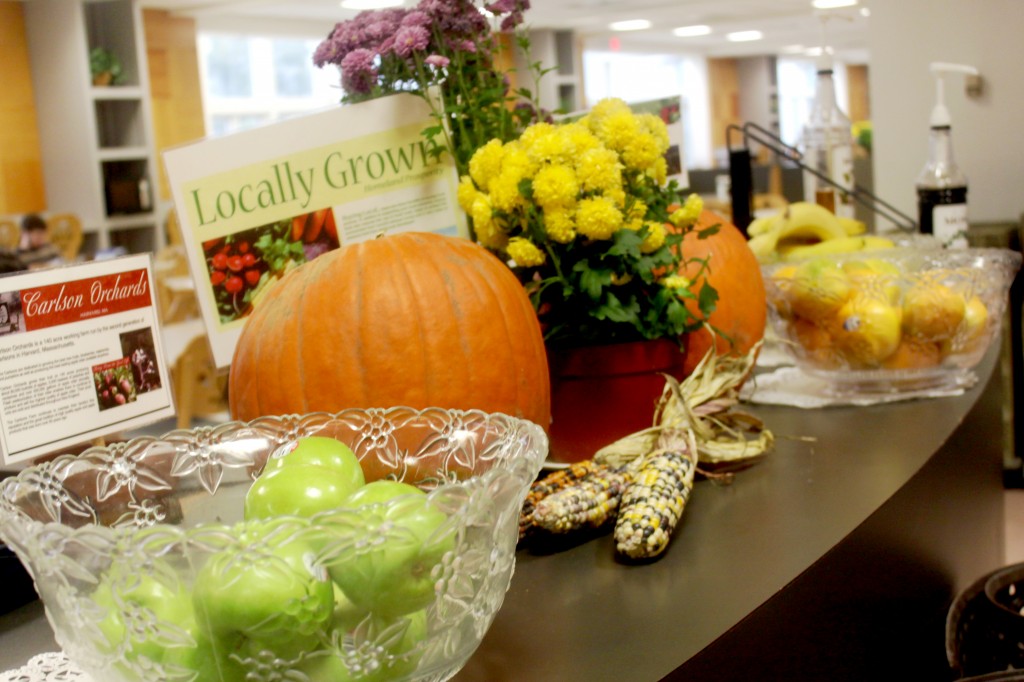Last year, Harris added a new extension to its salad bar: the locally grown section. In addition to the dining hall’s modern new look, Harris now allows environmentally conscious and curious students to try produce that is grown in New England and the tri-state area.
But in the lecture “The Myth of ‘Eat Local’: The Case of Tuscan Butcher Dario Ceccihini,” Zachary Nowak raised the question of whether local produce is really “greener.” Nowak spoke in the Charles Chu room at 4:30 PM on October 27. A professor of food studies at The Umbra Institute in Perugia, Italy, Nowak enjoys a “holistic view of education” in which “food is interdisciplinary.” Professor Nowak passionately argued that communities should view food in economic, political and cultural terms.
Nowak began by asking the audience, “Why is local important?” Several students quickly raised their hands to offer various answers to his question. Nowak then displayed a list of common assumptions about locally grown food on the projector. They included rebuilding the economy, food tasting better and fresher, decreasing green house gasses and the supposition that the local produce is healthier. Another student added that biodiversity helps to distribute products more efficiently and another even suggested that it makes capitalism fairer.
“In Indiana, where I’m from, I see the benefits of eating locally because it supports the community and pushes for a better lifestyle where eating according to season is necessary,” said RasAmen Oladuwa ’14, one of the students who provided an answer to Nowak’s query. “We’ve see obesity rates decline and a generally healthier population. My family is about to go directly to the farm that produces our food and that has helped me to have a greater appreciation for the food I’m eating.”
Meat is often left out of discussions surrounding locally grown foods, but Professor Nowak addressed this issue as well, asking the crowd, “How do we make meat and how do we eat meat?” He described his thesis, which began with a case study of a Tuscan butcher named Dario Cecchini. At the age of 18, Cecchini decided to become a veterinarian, despite having been raised by a butcher. However, a year and a half later his father died and Cecchini changed his career path from aiding animals to cutting them up for hungry customers and following in his father’s line of work. “He’s a real Renaissance man,” Nowak remarked. “His stereo is always on, either blasting Led Zeppelin or The Who.”
“The parts of a cow that are better for you are the organs: lungs, liver, heart and brain,” Nowak noted. Cecchini didn’t eat steak until he was 18 years old because all the customers bought the expensive cuts of the cow and all that was left was beef. “The butcher shop doesn’t work to produce what is served in the restaurant. Rather, the restaurant serves what the butcher shop produces.”
Nowak then explained that Cecchini gets his meat from Argetona, Spain, a good 683 miles and 45 gallons of diesel fuel away. Can Dario Cecchini still say that he strives for a sustainable living in his line of work?
Nowak told the audience that cows are ruminants, or mammals that have a plant based diet. However, cattle are being fed mass amounts of grain and corn that their bodies cannot digest. Eating the wrong food makes the cows sick and then they need antibiotics to keep them alive until they are fat enough to be eaten. It takes seven pounds of grains to make one pound of meat. “Doesn’t this sound sustainable and green?” Nowak asked sarcastically.
While it may seem environmentally friendly to eat local, Nowak suggested that the effects of eating local might not result in sufficient environmental change. Noam Waksman ’15 summed up Nowak’s argument: “If you want to buy locally grown food, then be a part of the local movement, but if you want to make a serious change nationally and globally, you need to make minor modifications in the way you buy, eat and cook your food.” •










[…] the full article on the website for The College Voice, Connecticut College’s student […]